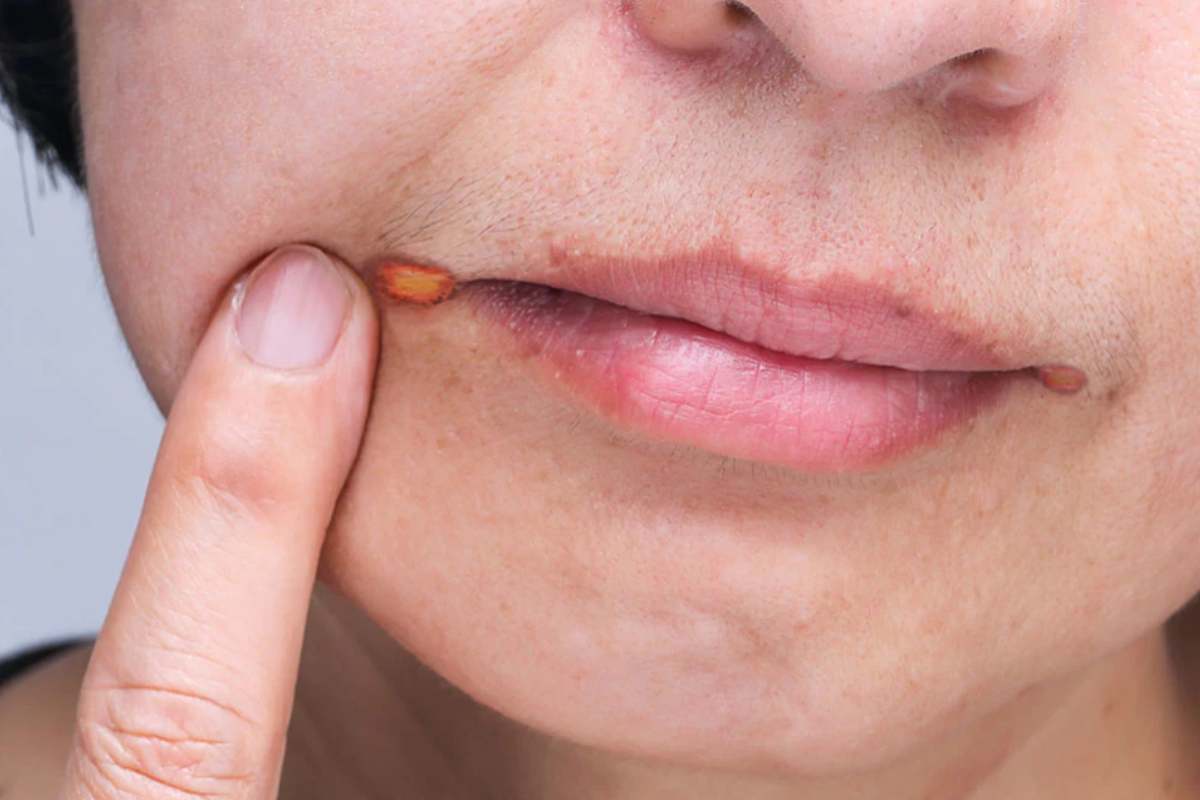Do you have pain, redness, or cracks around your lips? It could be angular cheilitis or a cold sore—two common conditions that often get confused.
While both affect the mouth area, they have very different causes, symptoms, and treatments.
This guide will help you understand the key differences so you can treat the issue correctly and prevent future flare-ups.
Table of Contents
What Is Angular Cheilitis?
An inflammation in the corners of the mouth, angular cheilitis is not communicable and is characterized by red, broken skin, bleeding, or crustiness.
Causes of Angular Cheilitis
- It often happens due to:
- Saliva buildup in the corners
- Fungal or bacterial infections
- Poor oral hygiene
- Wearing dentures
- Vitamin B or iron deficiency
- Dry, cold weather
- Then germs get in and cause irritation.
What Is a Cold Sore?
The herpes simplex virus (HSV-1) is the cause of cold sores, which are blisters filled with fluid that usually develop on or around the lips or mouth. They are extremely contagious.
Causes of Cold Sores
- You can get cold sores from:
- Close contact with an infected person
- Sharing drinks, towels, or lip balm
- Stress, illness, or sun exposure
- These things trigger the virus in your body.
How to Treat Angular Cheilitis
- Keep the area dry and clean.
- Apply a barrier cream (like petroleum jelly).
- Use antifungal or antibacterial cream, if needed.
- Fix any vitamin deficiencies.
- Avoid licking your lips.
- Drink water and eat a balanced diet.
- If wearing dentures, make sure they fit well.
How to Treat Cold Sores
- Use antiviral creams early.
- You can also take oral antiviral pills (like acyclovir).
- Apply cold compresses to ease pain.
- Avoid touching the sore.
- Don’t kiss anyone or share utensils.
- Cold sores usually heal in 7–10 days.
When to See a Doctor
- Go to the doctor if:
- You have recurrent sores
- The pain is severe
- The area is spreading or swelling
- You’re unsure what it is
- You have a weakened immune system
Home Remedies to Try
- For Angular Cheilitis:
- Coconut oil
- Honey
- Aloe vera
- Lip balm with beeswax
- For Cold Sores:
- Ice cubes
- Lemon balm cream
- Lysine supplements (talk to your doctor first)
How to Prevent Angular Cheilitis
- Use lip balm regularly
- Stay hydrated
- Don’t lick your lips
- Maintain good oral hygiene
- Get enough vitamins
- Fix ill-fitting dentures
How to Prevent Cold Sores
- Don’t kiss someone with a cold sore
- Don’t share personal items
- Use SPF lip balm outdoors
- Manage stress
- Sleep well
- Avoid known triggers like sun or illness
Cold Sore or Angular Cheilitis in Kids?
- Children can also get both.
- Cold sores spread easily in schools.
- Angular cheilitis can occur from drooling or thumb sucking.
- Check with a pediatrician for safe treatment.
Do You Have Both?
- Yes, it’s possible.
- Some individuals have cold sores on the lip and cheilitis in the bends.
- Treat each condition separately.
- Don’t self-diagnose—see a doctor for proper care.
Frequently Asked Questions
Q: Can cold sores appear in the corners of the mouth?
A: Rarely. Cold sores usually affect the lips.
Q: Is angular cheilitis herpes?
A: No. It’s usually caused by bacteria or fungus, not a virus.
Q: Are cold sores permanent?
A: The virus stays in your body, but the blisters come and go.
Q: Is angular cheilitis serious?
A: It can be painful, but it’s treatable and not dangerous.

